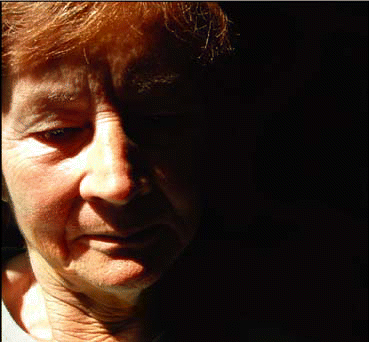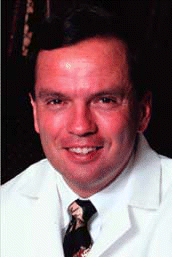Elderly patients have multiple reasons for losing their balance. Muscles are weaker, spines start to twist, bones may become brittle. Add vascular problems, vision loss, polypharmacy, and a sedentary lifestyle, and it’s no wonder that complaints of vertigo or dizziness affect some 70% of individuals age 65 or older.
Explore This Issue
October 2006Treating balance ailments can be challenging in patients of any age, but several factors make diagnosing and treating inner ear disorders in older patients particularly complicated.
When you talk about vertigo, you tend to think of an inner ear disturbance. But, it can be many things in the elderly, from loss of function from a viral infection to dislodged crystals in the ear, said Herman Jenkins, MD, Professor and Chair, Department of Otolaryngology, University of Colorado School of Medicine and Health Science Center in Denver.
While dizziness, or disequilibrium, has many causes, the most common are vascular or central nervous system maladies not usually seen in younger patients. It might be an infection. If the patient also has limb weakness or slurred speech, stroke is a real possibility. Or, the problem may be related to medication causing depressed blood pressure to the brain. If a sensation of spinning is involved, it might be benign paroxysmal positional vertigo (BPPV), the most common cause of vertigo in the elderly. How best should an otolaryngologist diagnosis and treat senior balance disorders?
Factors in Diagnosis
I think the main thing is to consider the comorbidities-vision and proprioception issues-when treating these folks, said Greg Ator, MD, Associate Professor, Department of Otolaryngology, Head and Neck Surgery, Kansas University Medical Center, Kansas City, Kan. These factors can adversely impact the response to therapy if not recognized.
Noting that three systems in the body-the visual, vestibular, and proprioceptive-act in concert to maintain stable orientation, Dr. Ator believes that the eyes are the window into the vestibular system and the strongest influence overall on balance.
According to Dr. Jenkins, the general otolaryngologist’s office doesn’t require highly sophisticated test equipment to diagnosis dizziness or vertigo disorders. Rather, they should look at the patient’s eyes for nystagmus, with electronystagnography (ENG) and the Dix-Halpike maneuver the most commonly used procedures.
When otolaryngologists do posturography on elderly patients complaining of balance problems, they can usually discern musculoskeletal issues that might not be associated with a diagnosis of vertigo. And the caloric test, using video systems, may show a slower responsiveness, possibly due to aging issues.
But even before testing begins, a thorough patient history is vital. The otolaryngologist listens to the sensations and time frame presented by the patient. For example, is he or she talking about lightheadedness and a woozy feeling, or a spinning sensation caused by an hallucination of motion? How long does the sensation last-seconds, minutes, or hours?
The time frame is very important in making a diagnosis of vertigo versus dizziness, said Joel Goebel, MD, Director of the Dizziness and Balance Center, and Professor and Vice Chair, Department of Otolaryngology, Washington University, St. Louis. Noting that vertigo lasts seconds, not minutes or hours, he said, If you listen to the patient, you don’t want to hear how long they’re dizzy as much as how long they’re spinning, how long the room is moving around them. Anyone who spins for even a few seconds is going to feel dizzy for quite a while afterwards.
Dr. Goebel added that a patient suffering from a spinning attack lasting more than a few minutes is probably going to present to an emergency room or an internist, where the patient will receive a scan to rule out a vascular event. Vertigo lasting for ‘minutes’ can be a TIA [transient ischemic attack] if associated with other brainstem signs. It can be migraine or even Meniere’s disease, although migraine and Meniere’s usually have a history of starting in younger years.
Vertigo lasting for hours-the person who wakes up spinning and can’t walk very well-that’s most likely vestibular neuritis, Dr. Goebel said.
The patient’s complaint will guide the otolaryngologist in one direction or another.
With BPPV, the patient complains of intense vertigo with sudden body position changes, such as turning over in bed. The disorder is due to calcium carbonate debris-otoconia-that has become dislodged from the utricle, possibly due to head trauma, infection, inner ear disorder, or degeneration in advanced age. Although the diagnosis might be made with history alone, ENG may be needed, as may the Dix Hallpike maneuver, in which the patient is brought from a lying to a seated position while the physician looks for nystagmus. More difficult cases may be diagnosed with a rotary chair test, where the patient sits in a chair, head affixed to a head holder, and using video goggles as well as videonystagmography. This testing system uses software to lock on the pupil for a tracing of eye movement.
Fortunately, BPPV is easily treated, most frequently with the Epley maneuver to reposition the otoconia particles. The patient’s head is rotated in a particular sequence, redistributing the misplaced otoconia.
Check All Medications
If the diagnosis is not BPPV, it may not be vertigo. Many physicians recommend a look at the patient’s medication list.
One thing we alert our primary care physicians to is overly aggressive treatment of hypertension, Dr. Goebel said. Patients get controlled too tightly. Vessels in the elderly have lost some of their elasticity; they don’t respond as well to position changes. If they get out of a chair or bed too quickly, they don’t have enough blood pressure to maintain function and they feel dizzy.
Dr. Goebel noted that 120 over 80 is the magical, mythical number that everybody is shooting for; however, that might be fine in somebody who is 25 or 30, but for someone 75 or 80, if you control them down to 120 over 80, that might be too tight.
Dr. Goebel added that he also sees elderly patients who are taking dizziness medication such as meclizine or Valium, and it has actually made them worse. I end up suggesting to their primary care doctor that they go off the sedative medication.
Otolaryngologists should also check the patient’s medication list for such drugs as aminoglycosides, which are known to damage the inner ear, the cancer drug cisplatinum, and salicylates, which can cause hearing loss, tinnitus, and/or dizziness. Once ototoxicity occurs, the damage can be irreversible.
In cases of degeneration of the vestibular system, Dr. Goebel said most of the time, these patients don’t say they are vertiginous. They won’t ‘spin’ because they are losing the system so slowly over a matter of years.
A head thrust test is one method to look for a dynamic visual acuity problem. The patient keeps eyes on a target while rapidly moving the head. If the patient has lost the ability to read while the head is moving, it may be a damaged vestibular system. Another test puts the patient on a compliance surface such as a three-inch foam pad, so the patient can’t feel the ground and can’t use the touch system in his or her feet for balance. If the patient sways when closing his or her eyes, the cause could be degeneration of the vestibular system, Dr. Goebel said. Treatment in these cases is usually vestibular rehabilitation therapy with a physical therapist who teaches special exercises to help patients adjust to balance problems.
From his own experience with a past patient, Dr. Goebel also urges otolaryngologists to consider normal pressure hydrocephalus (NPH) in elderly patients with balance complaints.
NPH is a very subtle gait disturbance, he said. Patients say they are starting to shuffle. In addition, they are having trouble controlling their bladder. A third part is memory loss.
The treatment, if NPH is caught in time, is a ventricular peritoneal brain shunt. If you’re early enough, the patient has a chance of stabilizing, Dr. Goebel said. If it gets to the point where their gait is so far off and their bladder out of control, they have much less chance of recovering what they’ve lost.
Whatever the cause of dizziness or vertigo, there’s no doubt that balance disorders are a huge health care issue for the elderly. Studies have shown that 12.5 million elderly individuals suffer dizziness with impairment of normal pursuits. More than one-third of adults age 65 and older fall each year, with falls the leading cause of injury deaths and the most common cause of nonfatal injuries and hospital admissions for trauma. A 2002 study showed that nearly 13,000 people age 65 and older died from fall-related injuries and more than 60% of the people who die from falls are 75 years old or older.
Otolaryngologists are especially well-positioned to help these elderly persons with a thorough medical history, diagnostic tests and timely treatment.
©2006 The Triological Society




Leave a Reply